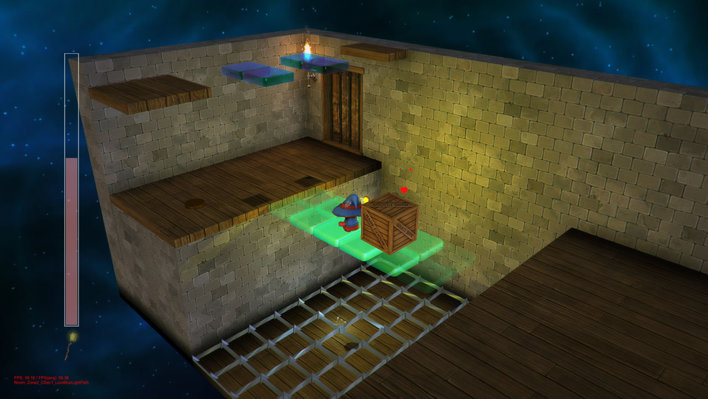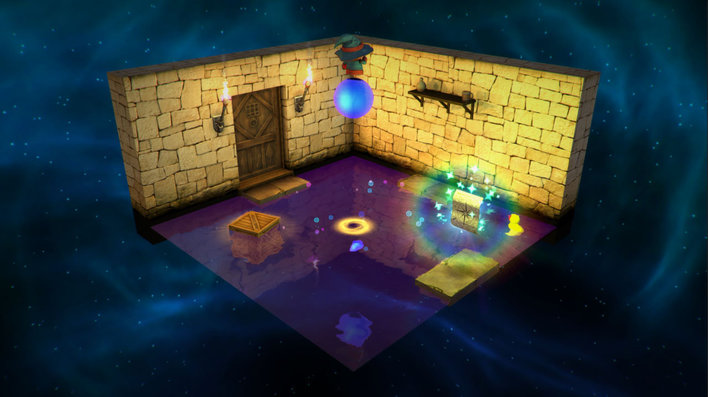The 80s - a decade where big hair, shoulder pads and neon leg-warmers were the flavour of the day, is often remembered fondly by the folks who lived through it - but what we tend to hear about less are the games. The heyday of the Amiga, Spectrum and BBC Micro, with gaming still in its early phase, and computer power substantially less than what it is today, developers were tasked with making the most out of what they had, and a now-largely-obsolete genre was king - the isometric adventure game. As kids of the 90s, we're not all that familiar with the likes of Knight Lore, Head Over Heels, Amaurote, Chimera, Solstice and Equinox - but the folks at Triple Eh?, the microstudio behind retro revival puzzler Lumo - assure us they were big back in the day. And who are we to argue?
What we do know is that although technology may have come a long way since then, the gameplay found in the isometric puzzlers of yore is still every bit as addictive today as it was back then - as the upcoming Lumo looks set to prove.

A literal 'companion cube', these crates will follow you around.
The idea behind the game is pretty simply. In the 80s, computers and games consoles were a lot less powerful than the ones we have today, and the idea of 3D was naught but a dream - but crafty developers soon found they could create the illusion of three dimensions via isometric projection. By keeping everything at a bit of a jaunty angle, you could effectively create a three dimensional world on a two dimensional plane, and give your players a whole world to explore in a more "realistic" way, linking puzzle and platforming-filled rooms together into one coherent adventure. Inspired by these games of yesteryear, Lumo takes the isometric ideas of the oldies and updates them to today's standards, creating a charming - and rather challenging - little puzzle game, packed to the rafters with nods and references to the 'good old days' of gaming.
"I created Lumo as a salute to an era of gaming that inspired me to become a game developer," said Gareth Noyce, founder and lead designer of Triple Eh? Ltd. "This game captures the magical feelings that video games conjure in all of us by incorporating challenging puzzles, atmospheric music and nods to iconic movies and pop culture."
And we're pleased to say, it's a lot of fun. We nabbed a brief hands-on with the game at last year's EGX expo in Birmingham, and it left us wanting more. Taking control of a vertically-challenged wizard, it's up to you to move him from room to room, solving tricky puzzles and dabbling in the occasional spot of platforming as you go. Whether it's dodging lasers, shuffling blocks, or avoiding fiery traps, the levels themselves will give your brain a proper work out, while you explore the strange dungeon-like mass of seemingly never-ending corridors and rooms to uncover all kinds of hidden secrets - and hopefully find a way out. With some 450 rooms, split over four different 'zones', and with oodles of secret paths, hidden rooms and collectable ducks to rescue, coins to find and half a dozen mini-games to master, it's got no shortage of things to do either.

Working out how to get to the ducks is a puzzle in itself.
How much you get out of Lumo depends largely on how much you put in - exploration and experimentation are king if you want to see and do everything Lumo has to offer. As a case in point, we managed to trial and error our way through the demo - but missed out on a heck of a lot of collectables along the way. We did however stumble into a rather long lift ride that ended in a bizarre little room, lined with toasters and patrolled by a clunky 80s style robot to the tune of this, a song given away free with a 1989 issue of Your Sinclair magazine as a joke.
Lumo will be hitting the PlayStation 4, Xbox One, PS Vita and PC next month, on the 22nd April. We're assuming it'll be a download release, although there's no word on pricing as yet - although the game will support both Cross-Buy and Cross-Save on PlayStation platforms, meaning that if you buy the one version, you'll automatically get the other free, and your save can be shuffled between the two versions for playing on the go and at home.

















